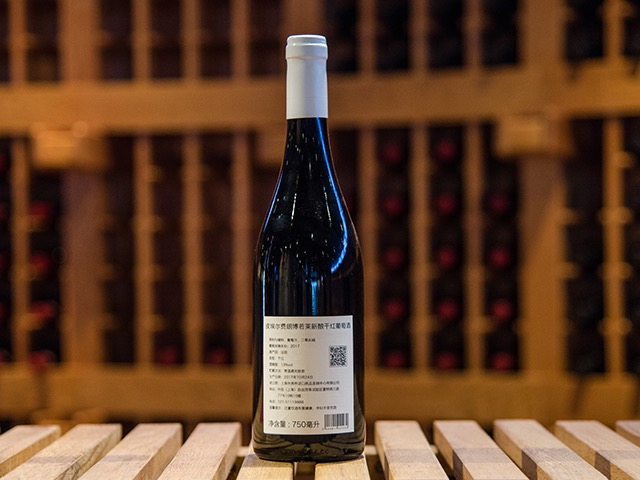In the world of blockchain there are many things happening at once. It is difficult to keep track of everything, and notable examples of successful implementations often go unseen and unheard. This was not the case with P. Ferraud & Fils, a French wine producer which uses blockchain technology for all exports to China. The purpose of the blockchain system is to prevent fraudulent products being sold in the country. French wine is exquisite and exotic, therefore it carries a significantly high price tag.
Chinese importers have been damaged by unsavory, entrepreneurial individuals in the country which have reused the bottles, filled them with cheap wine, and sold them as genuine. With the help of the VeChain project, Chinese wine importers have a technological tool to protect them from fraudulent sales and ensure that consumers are safe from fake wines. To learn more about this implementation we reached out directly to the producer “P. Ferraud & Fils” and asked a few important questions to Ms. Dana Gasiorowska, a sales official who supported our press request.

CryptoNews: When did the partnership with VeChain begin?
Gasiorowska: Our winery, P. Ferraud & Fils (created in 1882), is specialized in Beaujolais and Mâconnais wines. We’ve had a commercial partnership with a prestigious company: D.I.G (Shanghai Waigaoqiao Direct Imported Goods Co., Ltd.) for many years, where they import and distribute our wines, primarily in the area of Shanghai. The project to apply blockchain technology to wines was initiated by our importer in 2016. Then, in January 2017, we entered in contact with the VeChain team from Shanghai and begun to cooperate actively.
CryptoNews: What were the roles of the companies involved?
Gasiorowska: Our importer in Shanghai first set the targets and general specifications. The VeChain team was in charge of creating a solution that combines blockchain and IoT in such a way that it can be used both by us and by our importer and adapted to the specific issues linked to the wine business. From our side, we were often in touch with VeChain team to explain each step of wine production (eg vinification, bottling, labeling) as well as procedures linked to orders. The system is operational now and so we can say that P. Ferraud & Fils is the first company in the world of wine to use blockchain technology.

CryptoNews: What are the estimated losses due to fake products on the market?
Gasiorowska: It is impossible to estimate it. We have seen many examples of fake bottles, and are convinced that every exporter is concerned, us and so many other companies, even the most famous. Our winery has always wished to guarantee the quality of our wines. So this is dramatic for us if people buy fake bottles marked with our winery name, and are deceived with the content. It is damaging for both our brand image and turnover.
CryptoNews: How many wines do you export to China?
Gasiorowska: We export on average 100.000 bottles to China each year, having 2 main importers (only one implements VeChain so far)
CryptoNews: What are the differences between the traditional approach, and now using blockchain technology?
Gasiorowska: In the traditional approach, it is quite easy to duplicate any product and provide to consumers with fake information about it, while Blockchain technology provides a lot of security, as it is inviolable. Only us and our importer
have access to VeChain and the data contained. This data is mostly about
tractability details: for example bottling date, lot number, shipment date and
other.
Traceability is not new to us, we have efficient procedures for many years now to trace precisely each Cuvee, each bottle, from grape harvest until delivery. But, before, these procedures concerned only ourselves.
Now we share this information with our importer. Furthermore, they are also involved, as they send us their order through the VeChain Thor Blockchain platform and can also add further information about the wine, once we delivered it to them (for example: where are wines stocked). Also very important is that consumers get aware of all this. Each bottle has a unique QR code, like a sort of guarantee seal. So that they can be sure that the wine comes really from P. Ferraud & Fils winery.
(However, not all of the details are displayed to the consumers, as it would be supposedly very boring to them, so we made a selection of essential elements. Only professionals can have access to all the traceability details).
CryptoNews: Is the technology operational, i.e. are your wines on the Chinese market currently using the technology?
Gasiorowska: Yes, it is operational. The first order processed through VeChain was in July 2017. There were some issues in the very beginning, but soon after some improvements were done in the system, and all of those issues were resolved.
CryptoNews: What kind of investment was required from your company to implement the system (in terms of manpower, finances, education)?
Gasiorowska: From our side, the investment concerns mostly time spent during the conception of the system as we provided advice linked to wine specificities. Furthermore, as we use VeChain systematically now, it means that additional time is spent on the occasion of each order: we need to enter details to the system about each new Cuvee, about labels, and about the shipment. However, these time investments are very reasonable, and of all this can be done quickly.
CryptoNews: How did you come up with the idea to start using blockchain for this purpose?
Gasiorowska: The idea comes from our importer in Shanghai, D.I.G.. They’ve been using blockchain already for other luxury products for some time and it seemed relevant to all of us to adapt it to the wine market.
This project has been supported by the Chinese government, as the fight against counterfeiting is now their priority. They decided to create an organization specialized in the safety and traceability of wine and spirits: “Shanghai Wine and Liquor Blockchain Alliance” (the launching ceremony took place last June, with the participation of our manager, Mr. Yves-Dominique Ferraud)
CryptoNews: Now, after more than a year has passed in trials, would you recommend a similar system for other wine manufacturers?
Gasiorowska: The system has helped us circumnavigate a difficult problem for our partners. We hope to remain the only one in the wine sector and to keep this competitive advantage for ourselves.
CryptoNews: Can you briefly describe the process of placing product information on your blockchain?
Gasiorowska: We first select wines and enter several details about them into the system, for example: label pics, alcoholic degree, lot number, available quantity. Then our importer places the order through VeChain, and we confirm it on our turn. We still need to complete some details later, once they are known: lot number, shipment exact date, container number…
Our importer confirms order reception in the system when wines arrive in Shanghai. At this step, they generate QR codes, one per bottle. QR codes are then printed on the Chinese back labels (for wines delivered before VeChain creation, stickers were put on neck labels). Our importer also takes
care of commercial information transmitted to consumers through QR codes links.
CryptoNews: Are there any plans to incorporate the technology the entire range of products?
Gasiorowska: The technology is meant to cover all of our wines in China in the future. We do not plan to extend this proceeding to other countries so far, as we do not face the same difficulties.
CryptoNews: Thank you very much for your time, Ms. Gasiorowska. It was a pleasure to speak with you about this successful blockchain use case, and we would like to congratulate you and P. Ferraud & Fils for being a pioneer, one of the first well-established companies in the world to incorporate blockchain technology.
Gasiorowska: We would also like to thank you for the opportunity to talk about our experiences with this technology and share our views with your readers. Blockchain made sense for us to protect the integrity of our brand, and for our partners to protect their local consumers. It was an easy decision to make. With the help of VeChain the process was seamless and simple, only adding minor difficulties to our accounting process, while increasing the value of our brand. Once again, thank you very much.
Blockchain technology often receives criticism about the low amount of use cases that are practically tested around the globe. However, many times, successful implementations remain unnoticed and unheard.
Featured Images courtesy of VeChain Foundation & Unsplash.




